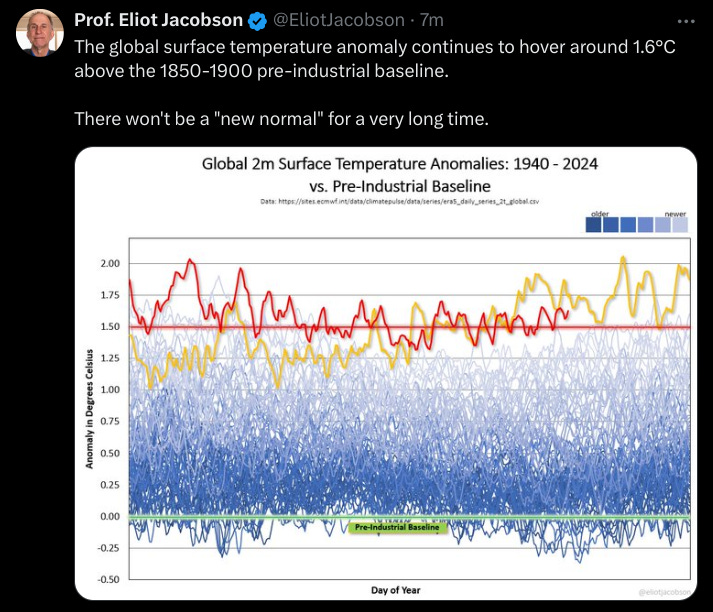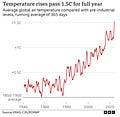I very much dislike climate alarm posts these days for reasons already stated (see “Name the Damn Perp”).
But climate news posts, on the other hand, deserve our notice — in particular, posts about unanticipated changes in “crisis scheduling.” We’ve been taught by those who get rich from the oil economy that “worrying later is fine; the crisis won’t come for decades, if at all.”
Unfortunately for them and us, news that the crisis is not sticking to schedule seems always to appear. This is one of those stories.
Carbon Sinks Are Failing
From The Guardian we learn:
Trees and land absorbed almost no CO2 last year. Is nature’s carbon sink failing?
The sudden collapse of carbon sinks was not factored into climate models – and could rapidly accelerate global heating
A carbon sink is a thing or a process that removes CO2 from the air. Our oceans are CO2 sinks. CO2 in the air dissolves in ocean water the same way it dissolves in regular water. There are other CO2-removal processes at work in the oceans. Like this one:
It begins each day at nightfall. As the light disappears, billions of zooplankton, crustaceans and other marine organisms rise to the ocean surface to feed on microscopic algae, returning to the depths at sunrise. The waste from this frenzy – Earth’s largest migration of creatures – sinks to the ocean floor, removing millions of tonnes of carbon from the atmosphere each year.
This activity is one of thousands of natural processes that regulate the Earth’s climate. Together, the planet’s oceans, forests, soils and other natural carbon sinks absorb about half of all human emissions.
After the obligatory “scientists are concerned” disclaimer that comforts the uncomfortable (more on that below), we see this:
In 2023, the hottest year ever recorded, preliminary findings by an international team of researchers show the amount of carbon absorbed by land has temporarily collapsed. The final result was that forest, plants and soil – as a net category – absorbed almost no carbon.
There are warning signs at sea, too. Greenland’s glaciers and Arctic ice sheets are melting faster than expected, which is disrupting the Gulf Stream ocean current and slows the rate at which oceans absorb carbon. For the algae-eating zooplankton, melting sea ice is exposing them to more sunlight – a shift scientists say could keep them in the depths for longer, disrupting the vertical migration that stores carbon on the ocean floor.
According to one of the scientists involved in the study, “Nature has so far balanced our abuse. This is coming to an end.”
After more disclaimers — this could be temporary; all could still be well — the writer says this:
The kind of rapid land sink collapse seen in 2023 has not been factored into most climate models. If it continues, it raises the prospect of rapid global heating beyond what those models have predicted.
Indeed.
A Note: ‘Scientists Are Concerned’
Paragraph three, high enough in the Guardian piece to be actually read, states: “But as the Earth heats up, scientists are increasingly concerned that those crucial processes are breaking down.”
This is a key part of the meta content of the story. This phrasing, while accurate, puts the focus on the scientists, not the problem, and emphasizes their “concern,” a mild emotion.
A better, more accurate statement is the following: “Those crucial processes are breaking down.” Period.
Because they are. The source of the Guardian article makes that clear. The authors say that “CO2 growth rate was … 86% above the previous year” (a fact), yet CO2 emissions only increased by “0.1 to 1.1 %” (another fact). Why the difference? CO2 removal has severely slowed or stopped.
It’s a simple equation. What goes into the air is a number. What remains is another number. The difference, a minus b, is what’s taken out. The amount taken out last year is vastly smaller than any previous year. The paper accounts for fluxes and latency. The data and scientists are clear: The carbon sink effect “is coming to an end.”
The Guardian, though, would rather mitigate your fear than give you straight facts. Thus “scientists are concerned,” not “here’s what’s happening.” The reader can decide who The Guardian is protecting.
Be Prepared
Another failure in the climate system says the crisis is ahead of schedule as our rulers define it. (Their projected schedule is whatever keeps you from feeling afraid.)
Warming is already nicely above the magic +1.5°C mark that the IPCC said spells disaster.

Most timelines put warming of +2.0°C in the mid-2030s. We could beat that by a lot if the carbon sinks fail. I’d consider being prepared.




>I’d consider being prepared.
How, exactly? What is anyone realistically supposed to *do* to "be prepared?"
On February 2, 2023 I had a brief discussion with Astrophysicist Gordon Fulks. We talked about the
weather. He said January was warmer than February would be, seemingly a contradiction of the seasons. With February weather in the history books turned out he was right because the Earth has an elliptical orbit. Our current orbit has us further from the sun in February 2023 than it was in January of 2023. I don’t suppose an executive order or a cap n trade tax can correct that. To help me understand, Gordon emailed this chart. It covers the last 800,000 years of climate data derived from ice core samples and the study of celestial movements.
From the chart you can see that:
1. Elliptical orbits, at the height of eccentricity, coincide with very cold ice ages.
2. We are in the Holocene Climate Optimum, a time of minimal orbit eccentricity. That is expected to continue for about another 10,000 years.
3. Periods of high CO2 follow periods of high volcanic activity as evidenced by volcanic dust detected in the ice core samples. Banning gas stoves isn’t going to affect CO2 numbers.
4. The blue line on top shows that the amount of solar radiation experienced at the polar regions varies with differing levels of Sun activity and changing atmospheric conditions. Fretting about the amount of ice at either the North or South Pole won’t change a thing.
As our solar system moves within our galaxy and our galaxy along with trillions of other galaxies moves around within the Universe we need to sit back, enjoy the ride and just be grateful for this gift of life on Earth. It’s time to realize that human activity is a product of nature and will never be its master /CLIMATE WEATHER/NWO - eliptical orbits.pdf